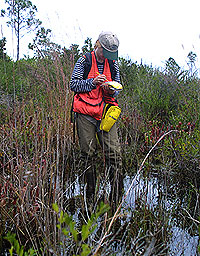Why not leave it alone?

A botanist records ecological information on a hand-held electronic data
logger. This information will be used to evaluate the health of the natural
community she's studying and to formulate management plans to maintain or
improve it. (Photo by Karla Brandt)
|
It's natural to think that a natural community is one that is pristine, untouched, not manipulated by humans. The problem is that humans have touched everything, directly or indirectly, oftentimes to the extent that the natural processes that maintain natural communities can no longer function without our help. Fire is one example. Many of the ARROW region's natural communities depend on regular fire. Without it, they would be invaded by plants that cannot tolerate fire, and they would change into a different community type, one in which the original community's plants and animals could not survive.
Reed Noss, a visionary ecologist who teaches at the University of Central Florida, wrote the following:
“[W]e must recognize that humans have so altered most ecosystems that natural processes no longer function as they once did. To not manage in these situations--to let nature take its course--is to invite extinction.”
Some examples of such drastic alterations listed by Dr. Noss:
- Habitat fragmentation: Natural communities are broken up by roads, buildings, farms, and pine plantations. The remaining patches are too small to support the wildlife that once lived there, particularly the large animals like black bears that need lots of room. The patches are isolated from one another so that they become practically useless for supporting wildlife
- Not enough fire: Habitat fragments of communities that need fire don't burn frequently enough to maintain their natural communities.
- Changes in water flows: Dams, ditches, and other structures that alter the paths and schedules of water flows in rivers and across landscapes have altered the natural functions of wetlands and destroyed habitat for many aquatic species, particularly fish and mussels. Such structures have also eliminated many of the benefits of wetlands, such as stormwater storage and runoff filtering.
- Human intrusion: A beautiful but sensitive place can be loved to death by too many visitors.
These are some of the reasons why we can no longer just let it be. Sad though it may be, it's also true.
